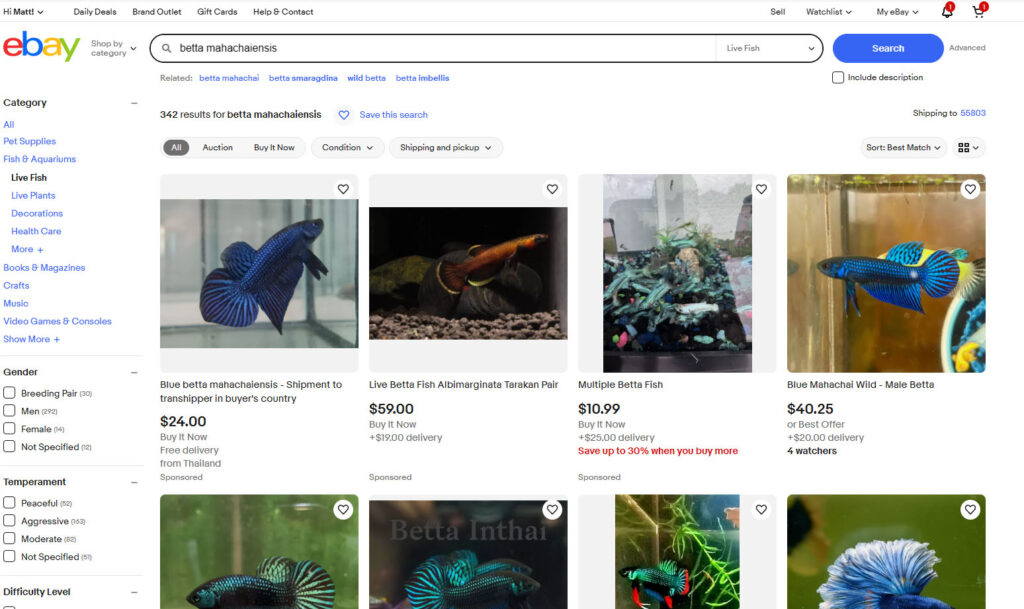
Word spread on Wednesday, February 19th, 2025, that eBay, the auction and marketplace platform, had banned the sale of live animals. Rumors and private messages suggested that sellers had been notified that the new policy would come into effect in 30 days.
With nearly two decades of blog-writing under my belt, and having worked under the late James Beard Award-winning journalist and Publisher James Lawrence for roughly 14 years, I’ve come to learn not to rush with the scoop. Lawrence always reigned in my eager tendencies, pointing out that it wasn’t important to be the first but to be the best. And when it comes to news like this, these sorts of rumors can sometimes turn out to be false (fans of the sci-fi show The Expanse no doubt recall the recent buzz that the show was being pulled from Amazon’s Prime service in the US, which ultimately was not true). So, I started investigating.
One of the first organizations I always contact when industry-impacting news comes to my attention is the Pet Advocacy Network. By Thursday afternoon, I received their response. “As an organization representing the responsible pet care trade, the health and well-being of aquatic animals is very important to the Pet Advocacy Network. We are not aware of the factors that eBay considered in arriving at this reported new policy, but we would welcome the opportunity to engage with them and assist in the development of any future policies with regard to companion animals.”
What If?
If true, the news could be devastating for online sellers of corals and fish who have used the platform for decades. Some, like marine coral retailer Aqua SD, closed over 100,000 sales during this time period. Vendors like Cornbred Corals have become synonymous with the platform, going as far back as 2001.
Entire brands and businesses likely depend on reaching new customers through this marketplace, and I speak from experience. During the time when I was an orchid hobbyist and breeder back in the 2000s, listings on eBay were the primary and predominant way I connected with new customers, who often became website customers and continued to purchase through auctions and other listings.
The impact is likely immense. While some potentially bad actors could lose access to a platform, which is arguably a good outcome, the reality is that eBay’s feedback and rating systems should help weed out scammers pretty quickly. I’d like to presume that most active vendors on the platform are making legitimate offers and aim to comply with the laws surrounding the aquarium trade.
At the time of writing, there were 3,478 offerings in the Live Aquarium Invertebrates category, 9,814 offerings in the Aquarium Coral & Live Rock category, and 13,174 offers of Live Aquarium Fish. Effectively, this is 26,466 listings would no longer be allowed under the new listing policies. I suspect no other online marketplace remotely approaches the scope of offers on display at eBay. For comparison, the decades-old auction site Aquabid has 1,966 active listings at the moment (although, sadly, the experience has become quite ad-heavy), while the emerging marketplace ReefNBid has precisely 200 listings at the moment.
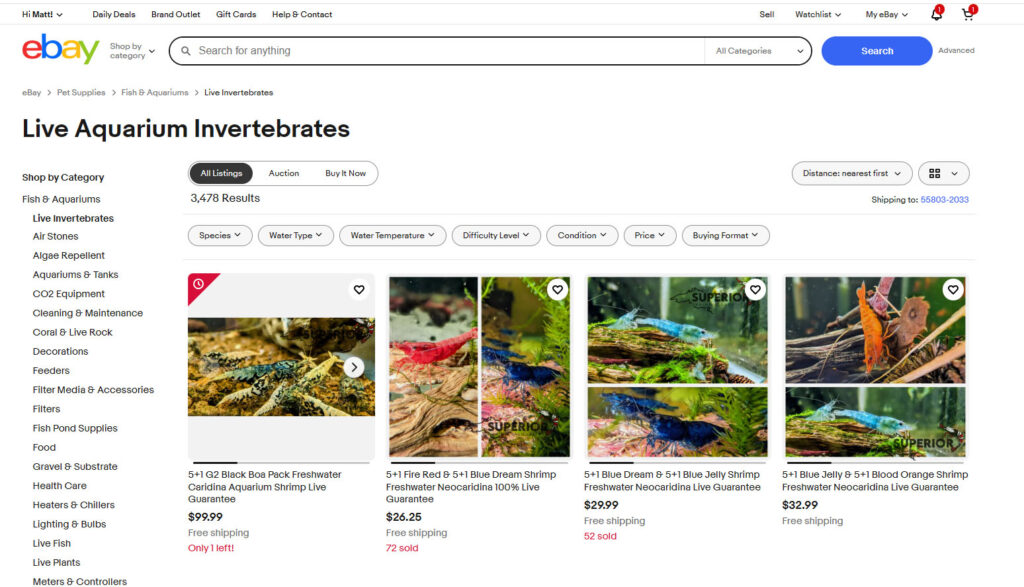
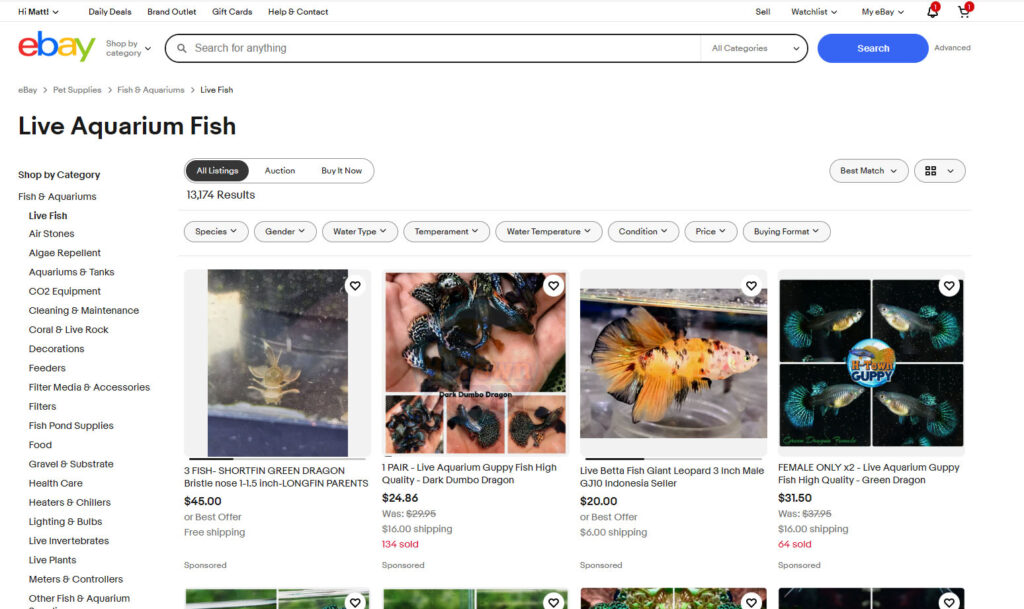
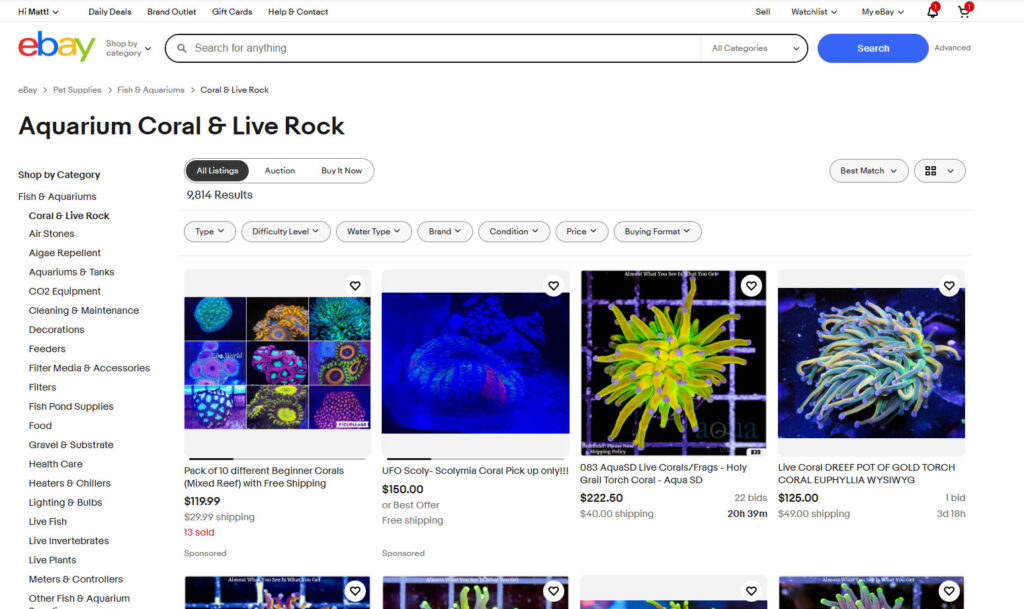
Given the size and scope of eBay and the fact that modern listing policies make your first 250 listings free, the undeniable truth is that eBay has been a cost-effective and low-risk way for new businesses to establish themselves and gain exposure. In a world where the barriers to entry for small businesses keep growing larger and more insurmountable, it may be fair to say that the loss of an affordable and effective platform could lead to fewer startups in the aquarium realm.
Is This Real?
Over the next two days, I contacted several eBay vendors, trying to confirm the existence of the message that had been sent to sellers. It wasn’t until the early morning hours of February 22nd that I finally received an easily verifiable example of the message from eBay, sent to a seller via email. The subject line reads: “Policy Update: Restrictions on the Sale of Live Animals on eBay.”
John Zika, founder of Minnesota-based Superior Shrimp & Aquatics, confirmed receiving the email and shared his experiences this week, writing, “I have been selling on eBay for about 3 years now…I used eBay to get my name out there as a quality seller of freshwater Neocaridina shrimp. We have sold over 3,000 orders on the platform, painstakingly building our online store brick by brick. We were literally coming off one of the busiest weeks I’ve ever had on eBay when I woke up to that email. I called my wife and we wondered if this would be the end of the small business we started.”
Some of the sellers I had talked to initially reported that they were not aware of this change, which meant that they had either overlooked or not received any communication from eBay. This is clearly concerning, particularly if you’re running a company with dozens or hundreds of active listings offering fish or corals at this time.
So, the rumors appear to be true. The current Live Animal Policy on eBay lists only four categories that are permissible:
- Bees and ladybugs that aren’t endangered or threatened species or species listed on CITES Appendix I
- Feeder insects, for example, crickets, dubia cockroaches, earthworms, or mealworms
- Fertilized eggs, when the name of the species is included in the listing
- Sea monkeys
In a rare twist, turning to Archive.org for examples of the page prior to the change was unproductive; archived content wasn’t viewable or accessible. However, author Liz Morton of the e-commerce blog Value Added Resource also covered this news in her post, “eBay Updates Live Animal Policy, Stops Sales Of Fish & Aquatic Invertebrates.” Morton managed to retain and publish a copy of the policy prior to the update.
From Morton’s capture of the prior policy, the following formerly permissible items were all apparently removed:
- Domestic (not exotic) aquatic snails
- Live bait such as minnows, shiners, earthworms, and mealworms
- Lobsters
- Mice sold specifically as food for pets
- “Stud” services (including by not limited to dogs, cats, horses, sheep, goats, and cattle)
- Tadpoles
- Tropical fish
It is worth mentioning that Morton’s version also notes that “Pets and other live animals not included in the list above are not allowed.”
For sellers of items such as corals, it is unclear if they were simply being “overlooked” in this pre-ban policy or were lumped under “Tropical fish,” which, while technically incorrect, would not be surprising given their general generic application as aquarium livestock. That said, a category for listings of “Coral & Live Rock” clearly exists on eBay, which implies eBay’s consent to allow these items.
The Message To Sellers
As I wrote above, it took more than two full days to finally find someone who could send me a copy of the message that had been sent to some sellers and had sparked the initial rumors. It is entirely unclear, however, why some sellers may have received the notice of the change while others may not have been flagged for notification.
For example, Reddit user WoolyHuskyDealer posted earlier on Friday, “I am a betta seller on eBay and haven’t received an email about this. I even contacted support and they said there’s been no change. I’d like to see some hard evidence. Anyone else?”
Getting answers and insight is proving difficult at this time.
eBay vendor adriansaquatics1 posted a copy of the notice received to the eBay support community. From this post, the messaging sent to some sellers is as follows:
“Dear Seller,
We are writing to inform you of an important update to our selling policies concerning live animals on eBay that directly impacts your current listings.
As part of our commitment to ensuring a safe and responsible marketplace, and in compliance with regulatory guidelines, eBay has decided to limit the types of live animals that can be listed and sold on our platform. This change will be implemented 30 days after the receipt of this email, and we kindly request your cooperation in complying with this new policy.
The following insects and animals are allowed, including:
- Bees
- Feeder insects such as crickets, Dubia roaches, earthworms, and mealworms
- Ladybugs
- Hatching eggs provided that they aren’t from migratory birds or endangered species and the seller provides domestic-only shipping.
Please review your current listings and remove any that don’t comply with our updated policy.
Thank you for your understanding and for selling on eBay. We appreciate your prompt attention to this matter and your cooperation in maintaining the integrity and safety of our marketplace.
Regards,
eBay Customer Support Team”
No Clear Reasoning
The reason for this abrupt change is unclear at best. eBay’s policy page includes just a two-sentence question and response:
“Why does eBay have this policy? This policy helps ensure that important government regulations are followed.”
Knowing that there are plenty of legal offers and law-abiding sellers on many online platforms, I have a very simple question: “What government regulations, exactly?”
eBay: No Response to the Request for Information
I emailed eBay’s press department early on February 20th to seek answers to questions regarding this scenario. eBay was notified that I intended to write about this topic and was invited to comment beforehand.
To be clear, I had no expectations that a large corporation would acknowledge the inquiry, and even if they did, I did not anticipate answers or even a statement. But it’s my job to try.
I have not received a response from eBay to any of the following questions at this time, but I will gladly publish their answers to any of these questions should one arrive.
- Can you confirm that these emails were sent? If so, who received these emails, and how were they selected?
- Can you confirm that there is a policy change due to go into effect?
- Can you confirm that the policy linked above is the new policy? If this is incorrect, what is the new policy?
- What date and time will the new policy actually come into effect?
- What external or internal change in the business or regulatory environment has instigated this policy change? Why now? Why not five years ago?
- The reasoning for the policy being listed is vague, stating, “This policy helps ensure that important government regulations are followed.” Please explain which specific government regulations are being violated by eBay and/or sellers, which have caused eBay to change policy to no longer permit the legal sale of a wide variety of live animals.
- Is this policy a global policy for the platform, or geographically restricted to the United States?
- What policies are in place for other regions outside of the U.S.?
- What specific problems have occurred causing this change in policy?
- Please explain the anticipated loss in revenue and listings as a result of this policy change.
- What alternatives are being offered to long-standing vendors on the eBay platform who have sold live animals on your platform, some for over two decades, and have built their brands in direct partnership with your platform?
- I am aware of, minimally, thousands of active listings on the eBay website that currently offer the legal sale of live animals within the United States at this time. Will these sellers see their listings removed? If so, when, and how?
- If listings will be removed, what fees, if any, might be refunded to sellers who have now lost access to the platform?
- What does eBay say to the sellers who have partnered with your platform, and are not violating any laws, conducting legal sales, who are affected by this policy change?
- What research, if any, was conducted by eBay, prior to adopting and sending notice of this policy change?
- Presuming that the policy linked at the start of this email is the correct and active policy going forward, how did eBay arrive at the determination to exempt feeder insects, certain bees and ladybugs, fertilized eggs, and sea monkeys?
- What external input was provided to eBay in making this decision? Was your company lobbied to make this change by one or more third parties? If so, which entities/organizations/individuals?
- Would eBay consider rescinding this policy change now or in the future, given the over two-decades long history of allowing these legal sales? What evidence or data is needed for eBay leadership to reconsider this abrupt change in policy?
- If consumers or vendors want to share their opinions or concerns, where should those comments be directed?
What Will Sellers Do?
“Now, eBay has every right to say what they can and can’t allow on their marketplace, but the kick in the teeth was the 30-day notice,” said Zika. “At least give sellers a couple of months to figure out what to do next. Their seemingly impromptu decision will close hundreds of businesses and impact thousands of buyers and hobbyists. There are many whose sole income comes from selling on eBay and won’t have anything to fall back on. To be honest, I’m pretty angry, especially since eBay collected [thousands of dollars] in fees from me last year, all while I was loyally selling on their platform.”
Online coral vendor Bobby Moon of KushCorals, who has seemingly cornered the market of selling coral live auction-style on the streaming service Twitch, can always be counted on for a hot take. The day the news first broke, he commented, “I always told ya never rely on other platforms or 1 platform.” And this isn’t the first time something like this has happened.
Some readers may recall Facebook’s ousting of animal sales from private individuals in recent years. In that instance, the ban targeted groups where peer-to-peer sales were happening. Entire groups were shuttered, and posts were removed. Ultimately, formal businesses such as local aquarium shops and established online businesses were granted an exemption from the policy, allowing the advertising of certain animals within the confines of their Facebook business pages.
Ultimately, when these Facebook policy changes came into effect, the smaller interest groups, for example, the mostly hobbyist-driven dart frog community, jumped away (pun intended) and headed to other social media platforms such as MeWe (have you ever heard of that one?!). Others get around the rules to this day by simply not listing animals for sale, instead simply implying that these animals want to “take a flight” or “go on vacation.” How long these tactics will work remains to be seen.
Current Status of Live Animal Sales
There appears to be a conflict at this time between eBay’s stated policy and the actual functioning of the website. I fired up my personal eBay seller account and wanted to see if I could list a Lightning Maroon Clownfish at this point in time. In the strictest sense, the policy that’s publicly posted suggests I shouldn’t be able to. Well…see the screenshot from my late-night attempt:
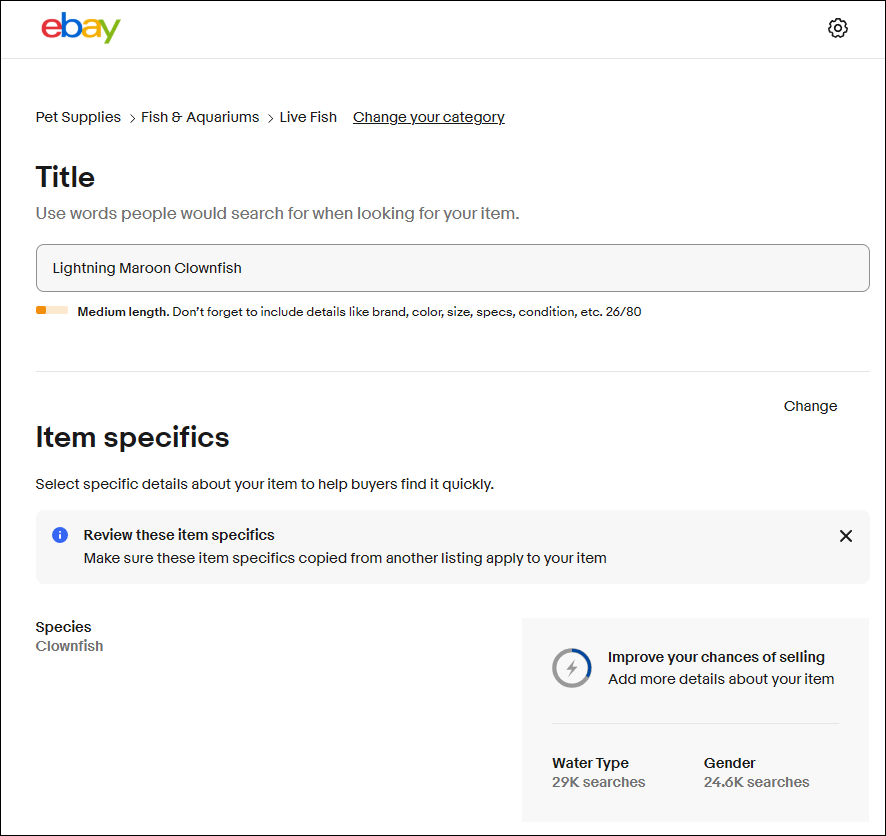
I remain confused. The live fish category remains a place where I can post a listing, while public policy says I shouldn’t be able to use it. The messaging that went to some sellers says this change takes effect in 30 days, so can I still list on day 29? At a more basic level, how could sellers with years of eBay presence and thousands of sales not be notified of this policy change, yet others were?
Is there more to come? Are established businesses on eBay going to be considered? Or is this just a case of eBay not identifying all the vendors this change will actually impact? Will some sellers be simply blindsided in less than a month from now?
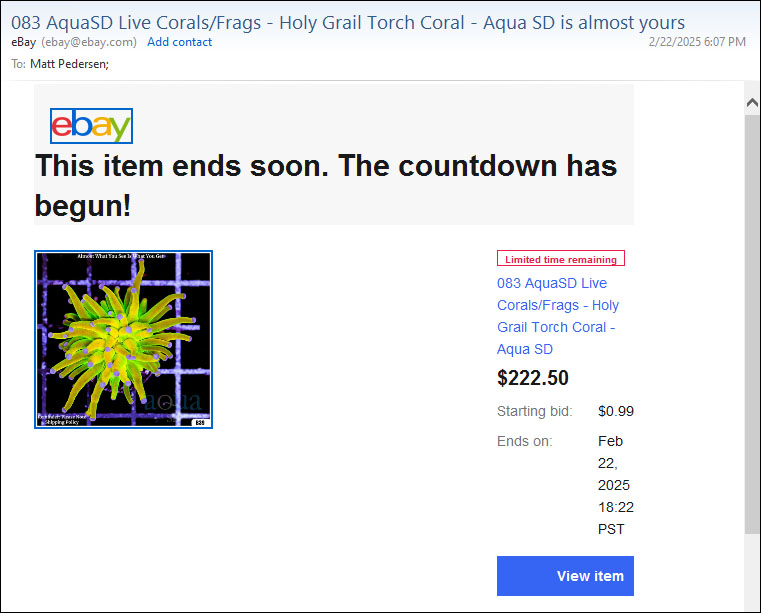
Most established eBay vendors already have a multi-prong marketing approach, selling directly to customers through their own websites or other specialized marketplaces. If this policy change truly comes into force, some legitimate businesses will be harmed, and they’ll have to adapt. The loss of eBay as a selling platform will hit some of its largest and longest-term vendors the hardest and couldn’t come at a worse time for independent retailers in the aquarium trade. eBay sellers will have to make inroads into other platforms, investigate new ones, or return to existing platforms that seem to have fallen out of favor in recent years; I’m thinking AquaBid for starters.
For Zika, the solution was clear. “There’s a hole in the market that needs to be filled now and fast. A buddy of mine floated the idea of creating my own marketplace after I made my announcement of eBay’s decision and how it impacts my business. I am a software developer in my day job, and I’m excited by the challenge of developing something to this scale and having a direct impact on a hobby I love. There is a need for something like this to be a safe place where we all can congregate around the love of the aquatics hobby. I’m working with complete strangers from all over the community who have volunteered their time to help me test, design, and provide feedback on a new marketplace that is being developed by aquatic enthusiasts, for aquatic enthusiasts. SeaBay is coming soon.”
Sellers and Buyers, Weigh In!
Are you an eBay seller? Do you shop for aquarium life on eBay? Where are you going to go now? Please share your thoughts in the comments!
UPDATE: On Monday, February 25th, eBay messaged sellers reversing course on the proposed elimination of most animal sales from the platform. Read the latest news!






I received the email from eBay about this upcoming policy change even though I have no live fish listings currently (I stopped offering on eBay due to issues with shipping this winter, but still offer on my own site). This policy change with eBay leaves few options to selling online, although it appears Amazon will continue to allow live fish sales. At least for now. I am actually looking at updating my website to allow others to sell on it as an option.
I don’t like SEAbay name sounds un-freshwater “AquaticBay”
‘